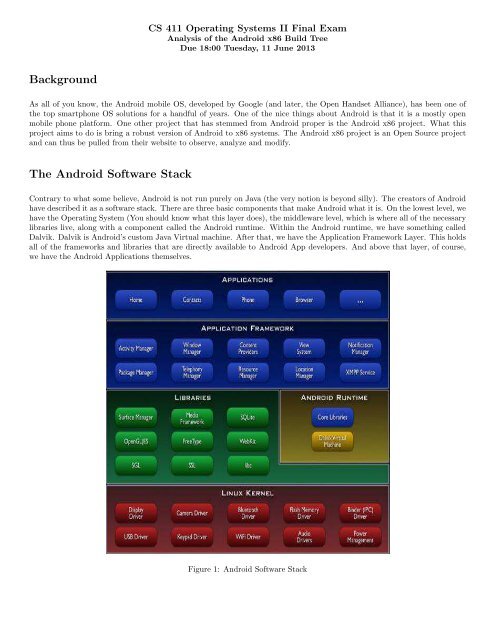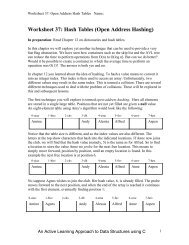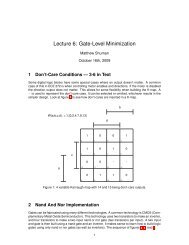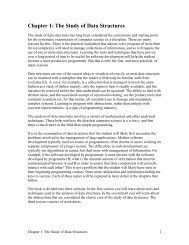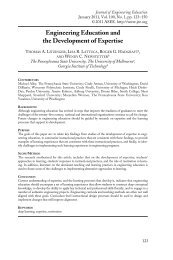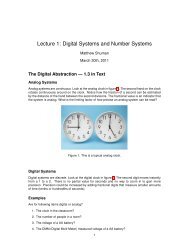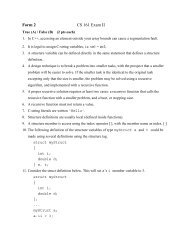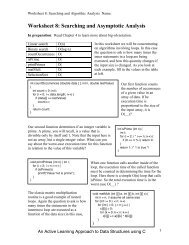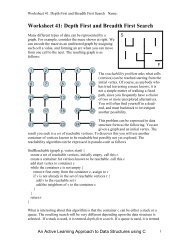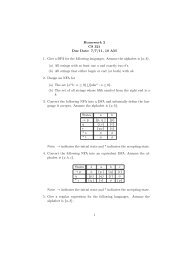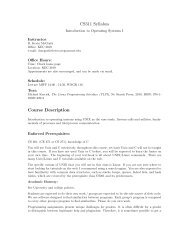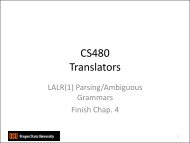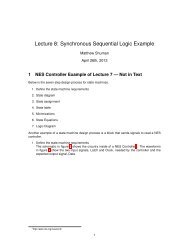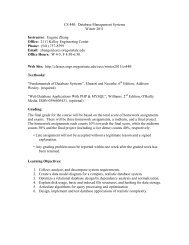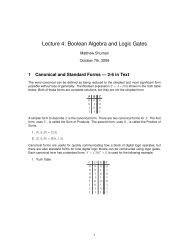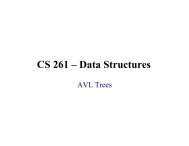CS 411 Final Exam: Analysis of the Android x86 Build Tree - Classes
CS 411 Final Exam: Analysis of the Android x86 Build Tree - Classes
CS 411 Final Exam: Analysis of the Android x86 Build Tree - Classes
You also want an ePaper? Increase the reach of your titles
YUMPU automatically turns print PDFs into web optimized ePapers that Google loves.
<strong>CS</strong> <strong>411</strong> Operating Systems II <strong>Final</strong> <strong>Exam</strong><br />
<strong>Analysis</strong> <strong>of</strong> <strong>the</strong> <strong>Android</strong> <strong>x86</strong> <strong>Build</strong> <strong>Tree</strong><br />
Due 18:00 Tuesday, 11 June 2013<br />
Background<br />
As all <strong>of</strong> you know, <strong>the</strong> <strong>Android</strong> mobile OS, developed by Google (and later, <strong>the</strong> Open Handset Alliance), has been one <strong>of</strong><br />
<strong>the</strong> top smartphone OS solutions for a handful <strong>of</strong> years. One <strong>of</strong> <strong>the</strong> nice things about <strong>Android</strong> is that it is a mostly open<br />
mobile phone platform. One o<strong>the</strong>r project that has stemmed from <strong>Android</strong> proper is <strong>the</strong> <strong>Android</strong> <strong>x86</strong> project. What this<br />
project aims to do is bring a robust version <strong>of</strong> <strong>Android</strong> to <strong>x86</strong> systems. The <strong>Android</strong> <strong>x86</strong> project is an Open Source project<br />
and can thus be pulled from <strong>the</strong>ir website to observe, analyze and modify.<br />
The <strong>Android</strong> S<strong>of</strong>tware Stack<br />
Contrary to what some believe, <strong>Android</strong> is not run purely on Java (<strong>the</strong> very notion is beyond silly). The creators <strong>of</strong> <strong>Android</strong><br />
have described it as a s<strong>of</strong>tware stack. There are three basic components that make <strong>Android</strong> what it is. On <strong>the</strong> lowest level, we<br />
have <strong>the</strong> Operating System (You should know what this layer does), <strong>the</strong> middleware level, which is where all <strong>of</strong> <strong>the</strong> necessary<br />
libraries live, along with a component called <strong>the</strong> <strong>Android</strong> runtime. Within <strong>the</strong> <strong>Android</strong> runtime, we have something called<br />
Dalvik. Dalvik is <strong>Android</strong>’s custom Java Virtual machine. After that, we have <strong>the</strong> Application Framework Layer. This holds<br />
all <strong>of</strong> <strong>the</strong> frameworks and libraries that are directly available to <strong>Android</strong> App developers. And above that layer, <strong>of</strong> course,<br />
we have <strong>the</strong> <strong>Android</strong> Applications <strong>the</strong>mselves.<br />
Figure 1: <strong>Android</strong> S<strong>of</strong>tware Stack
The <strong>Exam</strong><br />
If you look at <strong>the</strong> bottom level <strong>of</strong> <strong>the</strong> S<strong>of</strong>tware Stack diagram, you’ll see that <strong>Android</strong> is built atop a Linux foundation.<br />
This makes <strong>Android</strong> a wonderfully practical example <strong>of</strong> <strong>the</strong> concepts you have been learning throughout this term. It is my<br />
personal belief that examining how <strong>the</strong> Linux kernel is implemented for <strong>Android</strong> is not only fascinating, but also practical,<br />
and it will help drive home <strong>the</strong> key concepts that you have been learning during your time in <strong>CS</strong> <strong>411</strong>.<br />
Here is what we want you to do: Look back at your previous assignments, choose 2 key concepts (plus ano<strong>the</strong>r for extra<br />
credit) and briefly describe what your implementations for those to projects were. Then, dig into <strong>the</strong> android source (provided<br />
on os-class – /scratch/android/) and find where that concept is implemented, read through <strong>the</strong> code to figure out how<br />
<strong>the</strong> <strong>Android</strong> developers implemented that portion <strong>of</strong> <strong>the</strong> <strong>Android</strong>-specific kernel, and compare and contrast implementation<br />
algorithms between <strong>the</strong> <strong>Android</strong> version and your implementation.<br />
To be more clear, write a bit about how you implemented <strong>the</strong> 2 or 3 concepts <strong>of</strong> your choice, <strong>the</strong>n write about how <strong>Android</strong><br />
ei<strong>the</strong>r does things differently, or how <strong>the</strong>y are <strong>the</strong> same. <strong>Final</strong>ly, write about why you think <strong>the</strong> <strong>Android</strong> Developers chose<br />
<strong>the</strong> implementation that <strong>the</strong>y did – hardware capabilities, restrictions, etc. There should be, at <strong>the</strong> very least, one page <strong>of</strong><br />
writing for each concept. You are to write your paper in L A TEX and submit it just as you would have submitted a write-up.<br />
I’m very excited to see what you guys find and read your thoughts on why such implementation decisions were made!<br />
Why <strong>the</strong> heck am I doing this?<br />
Again, it is so important for a student to see <strong>the</strong> concepts <strong>the</strong>y learn applied in industry, and it just so happens that we have<br />
a very unique and popular source tree at our disposal for you to dig into. We want to help answer <strong>the</strong> “when am I ever going<br />
to use/need to know this?” question.<br />
You may very well never write ano<strong>the</strong>r process scheduler in your entire life, but knowing how it works, and having a solid<br />
understanding <strong>of</strong> what’s going on under <strong>the</strong> hood will make you a much better Computer Scientist. Plus, <strong>the</strong> word “science”<br />
is in <strong>the</strong> name <strong>of</strong> your field <strong>of</strong> study. What kind <strong>of</strong> scientists would we be if we never got our hands dirty and observed and<br />
examined? Have fun with this exam; it’s meant to prove to you that you know your stuff! You know real-world concepts<br />
implemented in real-world solutions. It really can’t get much cooler than that (unless if you invent something; that’s pretty<br />
awesome).<br />
Addendum: Group evaluation<br />
Please also include an evaluation <strong>of</strong> each <strong>of</strong> your partners, including contributions, ability to work well in a group, etc.<br />
The more detail and support you can provide, <strong>the</strong> more weight will be given to your evalution.<br />
Many thanks to Bryan Pawlowski for providing <strong>the</strong> concept and write-up.


